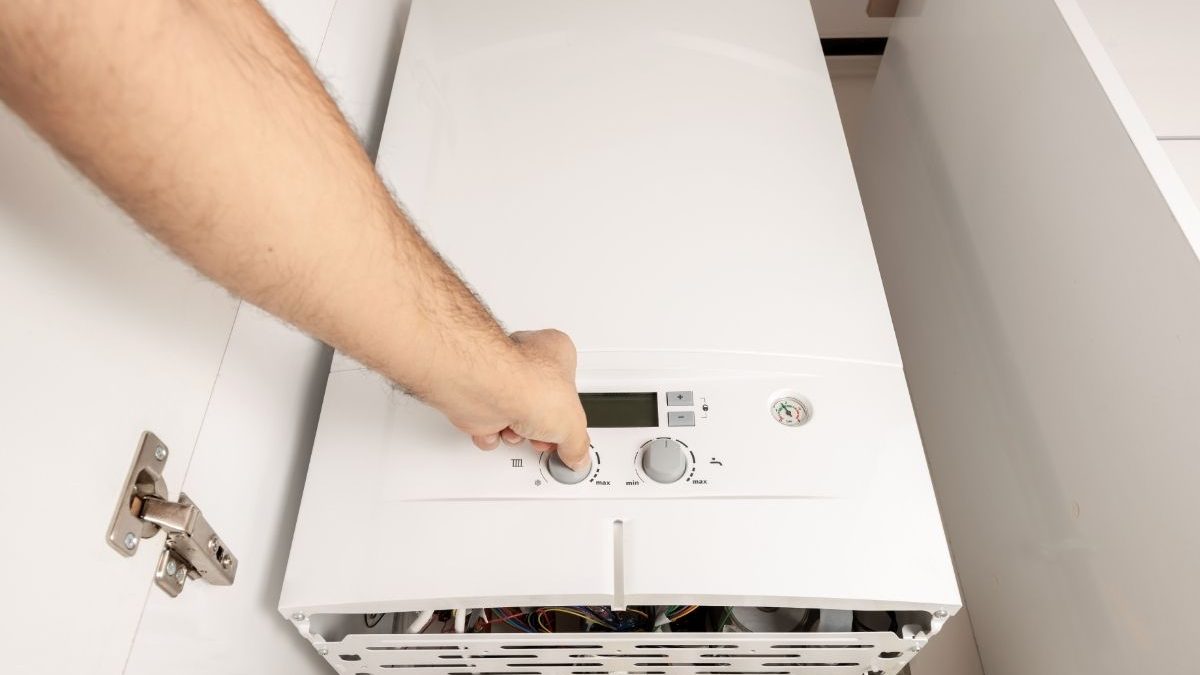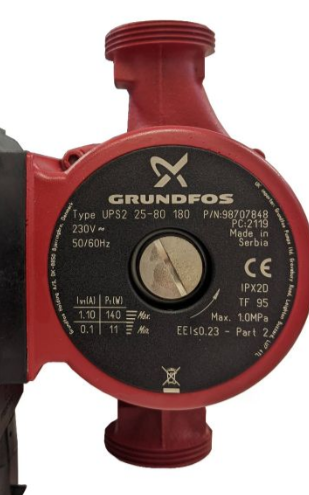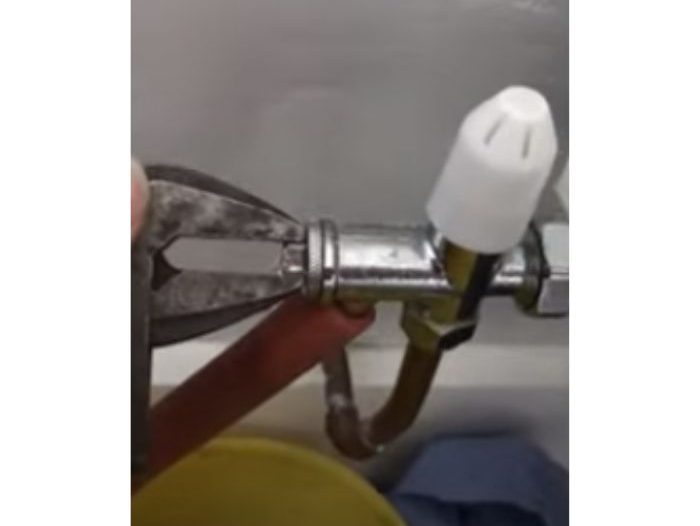If you have ever had to drain the central heating system out from a radiator to do some plumbing work, you will come across this issue of having an airlock in a combi boiler. If you get air stuck in the boiler you will hear strange sounds. Sometimes, it will lock out and not fire up at all. Here, we show you how to get rid of an airlock in the boiler.
Dealing with a combi boiler’s airlock can be a frustrating experience, with central heating issues. It’s crucial to understand the causes, symptoms, and solutions to effectively tackle this issue. In this guide, we’ll delve deep into the world of airlocks in combi boilers, offering valuable insights and practical heating system troubleshooting tips to help you maintain a smoothly functioning system.

Best Central Heating Magnetic Filters: Keep Your Heating System Clean
Airlock in Combi Boiler: Understanding the Issue
An airlock in a combi boiler occurs when trapped air prevents the proper flow of water within the system. This can lead to reduced heating efficiency, cold spots, and even complete shutdowns. Let’s explore the causes, symptoms, and solutions in detail.
Causes of Airlock
When the system is installed or refilled, air can become trapped in the pipes, radiators, or the boiler itself. Additionally, poor water quality can lead to the buildup of air pockets over time. This prevents proper water circulation in the boiler.
Symptoms of Airlock
- Cold Radiators: If your radiators are cold at the top but warm at the bottom, it’s a sign of trapped air.
- Gurgling Noises: Unusual gurgling or bubbling sounds coming from the radiators or boiler suggest airlock issues.
- Low Pressure: Airlocks can cause a drop in water pressure, affecting the overall heating performance.
Combi boilers are part of a pressurised system, so when you turn the heating on, radiators with trapped air will be cold at the top. Bleed the air out of each of these radiators with a radiator bleed key to clear the airlock, turning the valve anti clockwise to open it up. You will hear air escaping. Once done, repressurise the combi boiler by filling up water with the filling loop.
Getting air out of a combi system is an easier job than the other types of boiler.
Benefits and Costs of Using Heating System Inhibitor: Protect Your Central Heating
Solutions and Prevention
To alleviate an airlock:
- Bleed Radiators: Regularly bleed radiators to release trapped air. Use a radiator key and turn it slowly until air hisses out.
- Repressurise the System: Consult your boiler’s manual to learn how to repressurise the system, helping to dislodge air pockets.
- Seek Professional Help: If the issue persists, it’s wise to call a heating engineer to diagnose and rectify the problem.
How to Bleed Radiators and Clear Airlocks
Bleeding radiators is a straightforward process, but it requires care and attention. Here’s a step-by-step guide:
- Turn Off the Heating: Ensure the heating system is turned off to avoid scalding.
- Locate the Bleed Valve: Use the radiator key to locate the bleed valve at the top of the radiator.
- Prepare a Container: Place a cloth or container underneath the valve to catch any water.
- Open the Valve: Insert the radiator key into the valve and turn it slowly anti-clockwise until you hear a hissing sound. This indicates the release of trapped air.
- Close the Valve: Once water starts to escape without any air, close the valve quickly to prevent excess water loss.
- Check Pressure: After bleeding, check the boiler’s pressure gauge and repressurize if necessary.
Solutions and Prevention
To alleviate an airlock:
- Bleed Radiators: Regularly bleed radiators to release trapped air. Use a radiator key and turn it slowly until air hisses out.
- Repressurize the System: Consult your boiler’s manual to learn how to repressurize the system, helping to dislodge air pockets.
Clearing an airlock in a conventional boiler system
The most common areas where an airlock happens in a conventional system are:
3 way valve
The 3 way valve is a very common place for an airlock to occur. To clear it, you can loosen the nut on that valve, making sure not to take it right off. If you loosen the pipe slightly, the air will come out of that gap. Tighten the nut back up straight after.
Central heating circulation pump

You can often find an airlock around the central heating pump, especially if it’s fitted on horizontal pipework. Undo the front screw facing you and see if there is any air in there as often it is locked in the head part of the pump. Tighten the screw back afterwards.
You don’t normally see this problem happening if the pump is fitted on vertical pipework.
Radiators on lower floors
Another place where air can be locked is on the lower floor radiators. If you find the upper floor radiators working fine, but lower ones hot and cold, this could be a sign of an airlock.
To fix this, turn the valves to the off position on the higher floors which will force the heat down to the bottom radiators. As the system heats up, it should force the air up the pipework and out of the tank in the loft.
Before looking for the airlock, make sure you have drained the central heating system fully. Sometimes, pipes come down from higher floors to different radiators on the lower floors.
This means one part of the system will still have water in it and not be drained properly. So look for more than one drain valve in the house.

Tool to clear airlocks in heating systems
This tool, mainly for feed and expansion systems with a hot water cylinder in a cupboard and a water tank in the loft, will help clear the airlock. And you won’t have to drain the system down.
This automatic air vent can be fitted to a copper pipe either around the highest point on the system, or on the pipe between the hot water cylinder and the motorised valve, to release air immediately.
You may also need to fit the air vent near the point on the pipes where they drop to the lower floors. This is a potential location for an airlock to occur frequently.
FAQs
What is a combi boiler airlock?
An airlock in a combi boiler refers to trapped air within the heating system that obstructs the flow of water, leading to reduced efficiency and performance issues.
Can I fix an airlock myself?
Yes, you can attempt to fix a minor airlock by bleeding the radiators. However, if the issue persists, it’s advisable to seek professional assistance.
Why are my radiators cold at the top?
Cold radiators at the top suggest trapped air. Bleeding the radiators can release the trapped air and restore proper heating.
How often should I bleed my radiators?
It’s recommended to bleed your radiators annually as part of routine maintenance to prevent airlocks.
Can airlocks damage my boiler?
While minor airlocks might not cause significant damage, ignoring the issue can lead to reduced boiler efficiency and potential long-term damage.
What if bleeding doesn’t work?
If bleeding doesn’t resolve the issue, consult a heating engineer. They can diagnose the problem and provide appropriate solutions.
Conclusion
Dealing with an airlock in a combi boiler is a common challenge, but armed with the right knowledge, you can tackle it effectively. Regular boiler maintenance, proper bleeding, and following manufacturer guidelines can go a long way in preventing and resolving airlock issues. Remember, a well-maintained heating system ensures comfort and efficiency in your home during the colder months.
Related Articles
Disclosure: Some of the links above are Amazon affiliate links. This means that, at no cost to you, we will earn an affiliate commission if you click through the link and complete a purchase.
